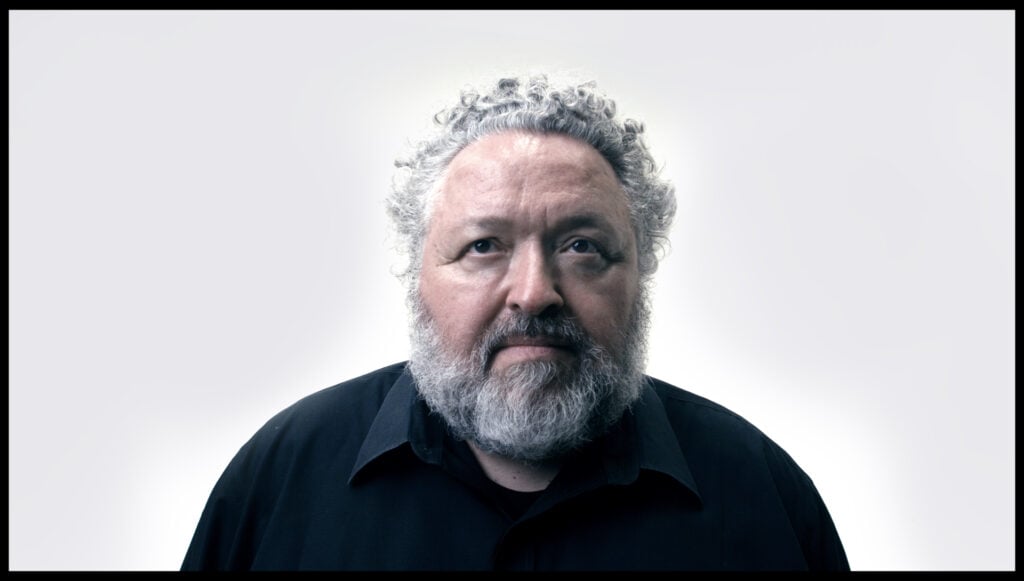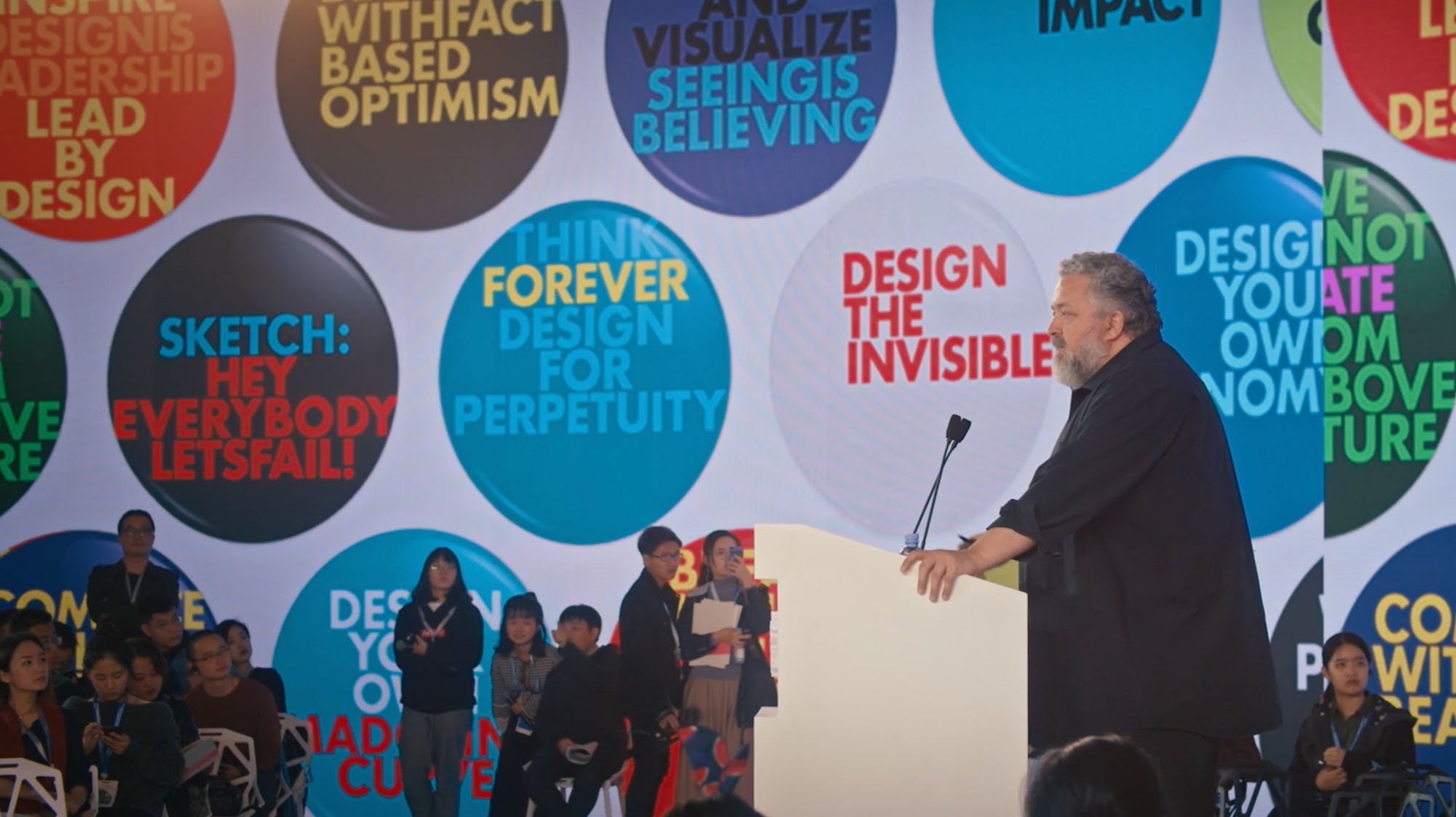
May 17, 2022
Q&A: Bruce Mau Discusses a New Documentary and Forthcoming Projects
Bruce Mau is a hard designer to pin down. He’s a graphic designer, notable for books such as S,M,L,XL, a collaboration with Rem Koolhaas. He’s also a branding designer, having launched Coca-Cola’s ecological initiatives and worked to rebrand the nation of Guatemala. He’s dabbled in architecture and landscape design, and he was even commissioned to re-plan the sacred city of Mecca (this project was never completed). His exhibition Massive Change made headlines when it was debuted at the Vancouver Art Gallery in 2004, a follow-up show planned for China was put on indefinite hold as relations broke down between Canada and the People’s Republic.
He’s known for thinking big, and for a perhaps overly optimistic belief that design can improve the world on an enormous scale. A new documentary directed by brothers Jono and Benjamin Bergmann, simply titled MAU, attempts to tell the story of the man behind the big ideas. On the occasion of the film’s release Metropolis spoke with Mau about his role in the filmmaking process and how he sees his long and colorful career.

Metropolis:
Do you want to tell us a little bit about MAU, how it came together, and how involved you were in the filmmaking aspect of the project?
Bruce Mau:
[The directors Jono and Benjamin Bergmann] came to meet me at SXSW while I was doing a performance there and they proposed to do a documentary. I really liked them, and so we eventually said yes—not immediately, but pretty soon. And that started a process where it really is their project. I said, “It’s up to you what you want to do. I’m happy to contribute as much as you need, but it’s really your project.”
So, I’m the subject, which is a very unusual thing for a designer—because I’m a control freak. But it’s really their version of my story. For it to be authentic, you need to actually allow them to have that kind of freedom and control. They were very respectful…[and] for the most part, it was very easy relationship.
Metropolis:
Are you satisfied with how the film came out?
Mau:
I am. I think they did a really beautiful job. I mean, it’s a very challenging story to tell because it’s really episodic. To fit those pieces together into a coherent narrative is a lot more difficult than it looks.
Metropolis:
Why did you decide that now was a good time to do a film?
Mau:
Well, I think the issues are super urgent. We don’t have a minute to wait and we lost a certain amount of time because of the pandemic. And it’s extraordinary that it is out, just to have a theatrical release of a movie about design. It was pointed out to me that that doesn’t happen very often. So that is great and I want to do everything that we can to support that because we need people to understand that this is it. We need to take on design in a way that we haven’t in the past and we need to do it urgently in a way that we haven’t in the past. So for me there really wasn’t any hesitation. It was like, “We’ve got to do this quickly.”
Metropolis:
Throughout the film there are these quotes from your book MC24 that pop up as little markers or section titles. Along with the soundtrack, these instructions such as “Begin with Fact Based Optimism” and “Work on What You Love” gave me this feeling that the movie was almost a self-help project or a self-help text. Do you see your role as a self-help guru offering advice?
Mau:
Well, in a sense, yes. I mean, the idea of the principles is to offer the power of design to people who aren’t necessarily designers to say, “You know what, we are all designers now and we live a designed life. So, you are living a designed life, the quality of that design is the quality of your life. If you have some tools to help you think of a design, it’s going to improve the quality of your life and the quality of your life is the quality of our environment. The decisions that you make in your life ladder up to a collective impact on the world.” So, helping people to actually think about how they live and design the outcomes, instead of just having random, accidental outcomes is really what we need to do.
When we finally saw the film for the first time at MoMA, we found the presentation for massive action was so inspirational we thought, “We got to do that.” And so, we decided to actually do Massive Action regardless of the [tense situation between Chinese and Canadian authorities that put Massive Action on indefinite hold]. [The Chinese] may come back and if they do, that’s great, but otherwise we now have five partners. We’re putting together a coalition of partners around the world to do it and do it in a different way, not with one single massive project or exhibition, but in multiple places and with different partners.

Metropolis:
A lot of the projects that the film ended up focusing on were things that didn’t really work out the way you had anticipated, right? The Mecca redesign project, the GuateAmala redesign project that got canceled, stopped, the…
Mau:
The GuateAmala project did work out the way we wanted it.
Metropolis:
The film gives the impression that some people were unhappy with it. Some of the people who had brought it into the country were removed from their jobs. I mean, the current situation of Guatemala is not great.
Mau:
It was transformational. It changed. I mean, you could tell from the film that it completely changed the conversation in Guatemala. As Mayor Del Carmen Senia explained, she was impeached because of the work that we did, but it didn’t stop the work. They’re now working with 2,600 organizations, and we continue to work with them. It really was transformational.
I think that doing that kind of work is like carving Jell-O with a chainsaw. You’re not going to get the details. It’s not going to be perfection. And a lot of design and designers is really about perfection; this is not. This is about movement. It’s about progress.
You’re not going to, by doing one project, erase a system of injustice that is historically based, but it doesn’t mean that the project wasn’t a wonderful thing to do.
Similarly with the transformation in Mecca, I don’t have control in Mecca to make them do what we offer, but we changed the conversation and that’s what the real work is. If you’re going to be in that game, you have to learn to accept that it’s very different than a lot of the work as Bianca Engles said in the film, “Sometimes my work is really the perfection of a detail.” And I love that total obsessive control, but sometimes it’s carving Jell-O with a chainsaw. You have to accept that it’s a dispersive practice and part of your work is being in the conversation.
Metropolis:
And is that how you’re able to stay so optimistic despite these roadblocks?
Mau:
It actually works against it. It’s super irritating and frustrating. No, I wish that I had total control. It would be easier.
Metropolis:
And yet you practice in this way where total control is impossible.
Mau:
Yeah. And so, I have come to terms with it, put it that way. I’ve negotiated a settlement. It’s a messy divorce.
Metropolis:
Do you think there’s a lesson in there for sustainable design or ecological design in terms of taking the long view?
Mau:
Yeah. Slow down. Let nature do the work. I mean, we just don’t have that language. We don’t have that part as part of our culture. We want results immediately and we want metrics, and we want all that.
If you think about the impact that we’ve had in the world and that we continue to have [as designers], we have a trash culture. You can trace it back to General Motors when they introduced the model year and planned obsolescence. And the whole idea that things are designed to be thrown away. The culture of garbage is still at the core of our culture and there’s such an urgency to change it.
Would you like to comment on this article? Send your thoughts to: [email protected]
Related
Viewpoints
Google’s Ivy Ross Makes Sense of Color
METROPOLIS sits down with Ivy Ross, Google’s vice president of hardware design, to discuss Making Sense of Color, now on view during Salone del Mobile 2024.
Viewpoints
Two Sustainability News Updates for Q2 2024
The building industry makes vital moves toward standardization and transparency on energy efficiency and social impact.
Viewpoints
How the Design Industry Is Navigating the Sustainability Surge
Discover new ThinkLab research that suggests sustainable design is hitting its stride.





